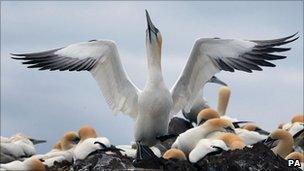Scottish SPCA calls for guga hunt ban
- Published

Gannets are a large seabird which colonise Scotland's mainland and island coasts
An animal welfare charity has called the traditional harvesting of young seabirds on the Western Isles as "barbaric".
The Scottish SPCA has written to the Scottish government asking for a ban on the annual guga hunt be put in place.
Thousands of gannet chicks are taken from the island of Sula Sgeir, north of Lewis, to be eaten as a delicacy.
The government said it was satisfied the methods used to kill the birds were not inhumane if done competently.
The Scottish SPCA said the birds were caught using a noose on the end of a pole and then beaten to death.
Other animal welfare groups have made previous calls for a ban.
Guga hunting is centuries old and takes place in late August.
Scottish SPCA chief superintendent Mike Flynn said the tradition caused suffering.
He said: "A competent person may kill one or two birds outright with a single blow, but in our opinion most will take more than one blow to be killed.
"This has to be considered in the context of this particular species of bird as gannets have exceptionally strong necks and heavy skulls, which enable them to dive into the water for prey from very high heights and at great speeds."
The Scottish government said there would not be any move to ban the hunt.
A spokesman said: "We are satisfied that there is no conservation risk to the local gannet population posed by this traditional hunt.
"We are also satisfied that, provided it is done effectively and competently, the method used to dispatch the birds is not inhumane."
Strong smelling
In Scotland, colonies of the large seabird are found at Troup Head, near Fraserburgh, on St Kilda, the Northern Isles and Bass Rock in the Firth of Forth.
Two years ago, author Donald S Murray's The Guga Hunters was published.
The former English teacher gathered tales from hunts and similar harvests on the Faroes, Iceland and Orkney.
Mr Murray also wrote a pamphlet of poems, called Praising the Guga.
About 2,000 birds are harvested a year. The meat is described as grey, strong smelling and salty.